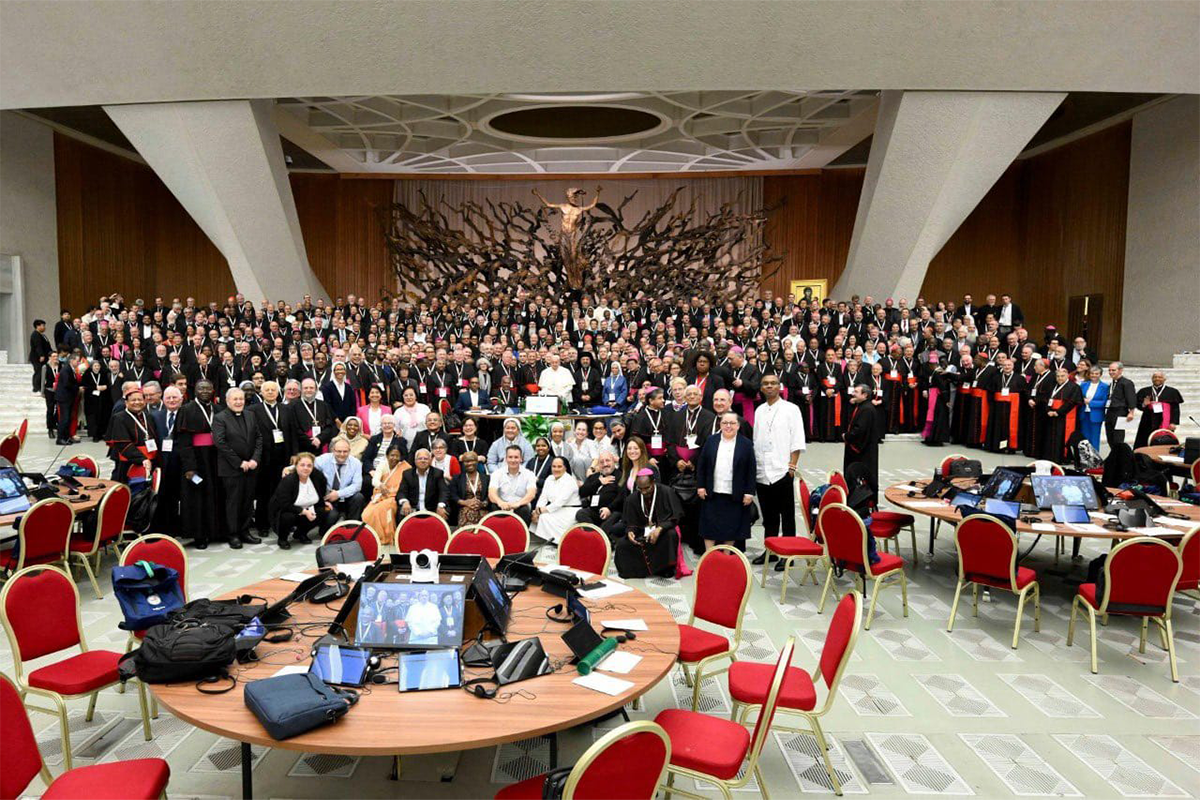
The Disciples of Christ: Journeying with the Catholic Church in Their Synodal Process
The Disciples of Christ, a relatively young communion compared to longstanding Christian world communions such as the Eastern and Oriental Orthodox, Roman and Eastern Catholic, Lutheran, Reformed, and Anabaptist churches, have nonetheless established a profound ecumenical presence. Since the Second Vatican Council, the Catholic Church has recognized the Disciples as a valued ecumenical partner, inviting them to various Synods of Bishops and engaging in a continuous international dialogue through the Disciples Ecumenical Consultative Council (DECC) since 1978. This ongoing relationship reflects a deep mutual respect and commitment to Christian unity. [Learn more about the Disciples-Catholic International Dialogue here].
In 2021, Pope Francis launched a three-year synodal process, envisioning “synodality” as the Catholic Church’s modus vivendi et operandi (way of life). This synodal journey focuses on listening to all voices in the Church—ecumenical communities, interfaith neighbors, the marginalized, and creation—with an openness to the guidance of the Holy Spirit. At its core, this process embraces unity within diversity, recognizing that each voice and charism is a gift that enriches the Church’s mission.
The Disciples of Christ have journeyed alongside the Catholic Church in this path toward synodality. In the early stages, Rev. Dr. Robert Welsh, president emeritus of the Christian Unity and Interfaith Ministry, participated in a consultation organized by the Dicastery for Promoting Christian Unity, providing ecumenical perspectives on synodality.
During the first session of the XVI Ordinary General Assembly of the Synod of Bishops in October 2023, the Disciples of Christ were invited to participate, and I attended only the final week to receive the session’s concluding document due to time constraints. Recognizing the importance of full engagement in these conversations, I took a sabbatical for the second session in 2024 to fully commit to the month-long synod. This period involved a rigorous schedule of deep listening, reflection, and dialogue focused on the Church’s mission for the world. As my ecumenical colleagues aptly described it, the synod was “nothing but ordinary”—a journey marked by listening, discernment, healing, reconciliation, and transformation, while also engaging in the necessary tensions, frustrations, and challenges.
Insights from the Synod’s Final Document: Reflections from a Disciples Perspective
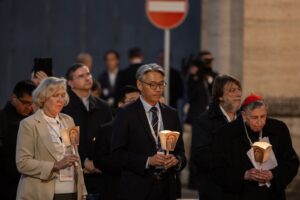
Ecumenical Vigil During the Synod
The final document of the 16th Ordinary General Assembly of the Synod of Bishops emphasizes the development of a synodal Church grounded in themes of communion, participation, and mission. Organized into five parts, it calls for transformation led by the Holy Spirit and modeled after Jesus’ inclusive ministry. Key themes include renewing relationships within the Church and society, fostering inclusivity, and embedding synodal practices at every level of Church life. It highlights transparency, accountability, discernment, and calls for greater ecumenical, interfaith, and ecological engagement. With the Eucharist as its foundation, the document envisions a Church that fosters covenantal relationships, mutual respect, and a mission-driven approach across vocations, charisms, and ministries.
The ethos of the final document from the Synod’s second session strongly resonates with the history and ecclesiology of our communion. The Disciples of Christ, a worldwide fellowship of churches, trace our roots to early 19th-century America, with congregations now spanning twelve nations and six “Uniting and United Churches” worldwide. This movement emerged from two distinct calls for Christian unity, led by Barton W. Stone and Thomas and Alexander Campbell, who opposed divisions in the Church, especially around the Lord’s Supper. Stone’s 1801 Communion Revival sparked a commitment to Christian unity, later formalized in his “Last Will and Testament of the Springfield Presbytery,” advocating for a unified church. The Campbells reinforced this unity, rejecting creeds as barriers and promoting open communion. By 1832, these movements united, focused on restoring New Testament practices, including weekly communion, baptism by immersion, and a commitment to the priesthood of all believers. The Eucharist remains central to the Disciples’ identity, representing unity in Christ and inspiring mission and service. Dedicated to “unity with diversity,” the Disciples actively engage in ecumenical dialogue, enriched through theological engagement with other Christian traditions.
While the Disciples of Christ do not typically use the term “synodality,” we share many of its core values, such as journeying together, listening, and being guided by the Holy Spirit. Disciples prioritize mutual accountability and covenantal relationships across local, regional, and national levels rather than employing a “top-down or bottom-up hierarchy.” We describe this mutual accountability as a “covenantal relationship,”, which emphasizes collaboration and shared governance, affirming the involvement of all members, including the laity, in the Church’s life and mission. In this sense, the Disciples of Christ are a “covenantal church” – not a hierarchical church, a connectional church, a confessional church, or a congregational church. Similar to Pope Francis’ vision for synodality in the Catholic Church, which strives for a balanced, collaborative structure of decision-making and also decision-taking, the Disciples’ covenantal approach fosters community-wide participation and discernment, grounded in mutual support and accountability. I hope that the Disciples’ “covenantal ecclesiology”—where each expression of the Church is characterized by integrity, self-governance, authority, rights, and responsibilities, and “where the local Eucharistic community has primacy”—might be given thoughtful consideration within the Catholic synodal process.
Unity at the Eucharistic Table: A Place to be Sent Out for God’s Mission
A central theme of the synodal document is the Eucharist, not merely as a symbol, but as the place of encounter and unity that calls us into a life of inclusivity, respect, and collaboration across vocations, charisms, and ministries. For the Disciples of Christ, the Eucharist is where we encounter Christ and one another, and from this Table, we are called to embody reconciliation, welcome, and hospitality—the good news that we are then sent to carry into the world.
I believe that our shared journey toward becoming a missional church, as Catholics and Protestants, must begin at the Eucharistic Table. I am grateful to join the Catholic Church in working toward a missionary synodal Church and commend their bold decision to include ecumenical delegates in the synod. Yet, there is a profound sorrow in our inability to share the Eucharist together, even as we are united in the same Holy Spirit.
The historic “wall” dividing Christian communions persists, and dismantling it is vital so that all Christians might one day share in the Eucharist as a sign of God’s gift of unity in Christ. In this spirit, the Catholic Church could fully embody a synodal Church, committed to God’s mission in unity with all other Christian churches and ecclesial communities.
Respectfully submitted by Rev. Paul S. Tché
Disclaimer: The views and opinions expressed in this article are solely those of the author and do not necessarily represent the views of the Disciples of Christ World Communion as a whole.
Pictures from the Synod
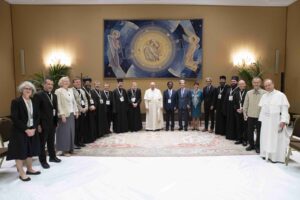
Fraternal Delegates with Pope Francis
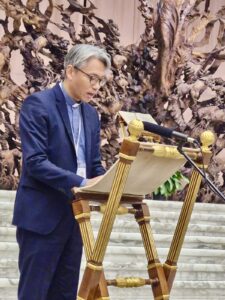
Reading the Gospel during Morning Prayer
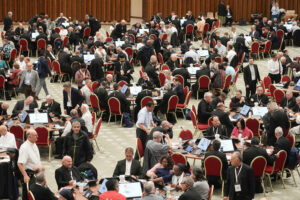
Synod in a session
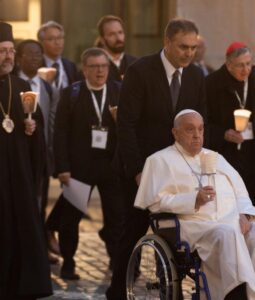
Ecumenical Vigil
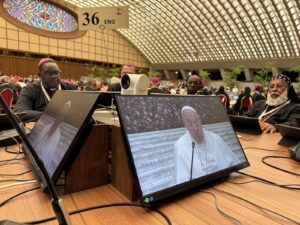
Pope Francis’ Intervention during a Session
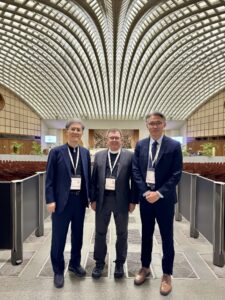
Fraternal Delegates from WMC, LWF, and DECC
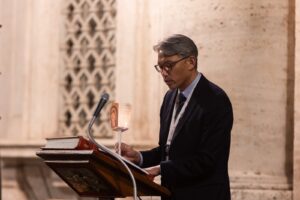
Ecumenical Vigil During the Synod
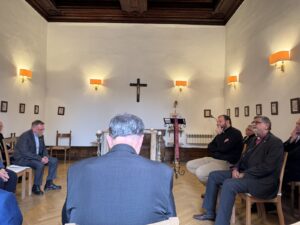
Prayer Session with Fraternal Delegates, the Synod General Secretariat, and the Dicastery for Promoting Christian Unity at the Anglican Centre, Rome, Italy